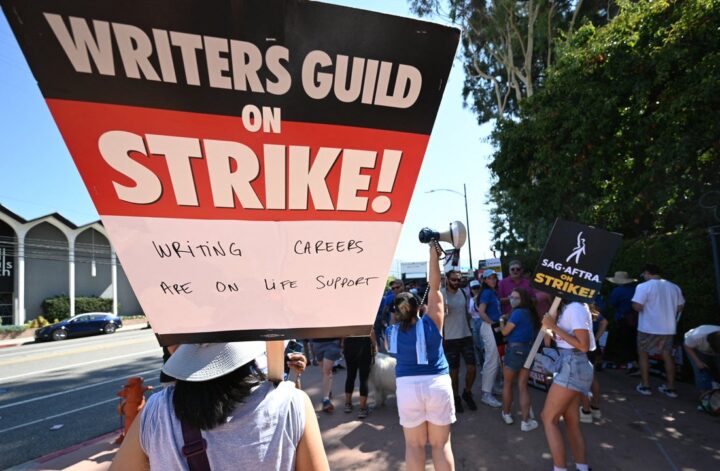
The Writers Guild of America (WGA) is in the midst of a historic strike, having been on the picket lines for 106 days. For awhile, it looked like neither the writers’ nor the Alliance of Motion Picture and Television Producers (AMPTP) would budge, with the former fighting for measures crucial to their members and the latter seemingly staunch.
But hey, strikes work – as more and more projects have been pushed back, and as studios like Sony have reported feeling the financial strain, the AMPTP has met the WGA’s repeated requests to return to the table. For the first time in months, it seems like there’s some positive movement.
Bloomberg reported last night that Hollywood studios have brought a new proposal to writers, offering several concessions on some of their key measures. AI is a big one, as writers have been concerned about being replaced by computers attempting to replicate their work. In response, the AMPTP, which represents major Hollywood studios like Disney, Warner Bros., Netflix, and more, has reportedly offered a proposal that ensures humans – not computers – are credited as writers of screenplays.
The reported proposal also says studios will reveal numbers for how much their shows are viewed on streaming services. That point has been shrouded in mystery just about since the advent of streaming, and having those numbers will allow writers to see how popular their programs are (just ask the writers of Suits, who’ve been speaking out about this ever since the legal drama claimed massive streaming numbers).
It also reportedly includes an increase of more than 20% for residuals when a writer’s program appears on additional networks, as well as a 5% increase in base pay for their first year (a rise from the 4% they previously offered, but still lower than the WGA’s goal of 6%). Additionally, the offer apparently includes a minimum duration of work for so-called “mini rooms,” which have been a major point of contention among writers. According to Variety, the proposal would allow give writers “significant authority” over the size of the writers’ room.
In more possibly promising news, in response to the proposal (which was reportedly made on Friday), Deadline reports that the WGA and AMPTP will be meeting this afternoon to continue negotiations. We should caution that that doesn’t mean the strike will come to an end today, or even this week; after all, they met for the first time since the strike started on Aug. 4, but apparently left the meeting after only an hour, finding themselves stuck on important issues.
Still, it’s a good sign that the two sides talking, and to see the studios conceding on at least some measures.
It’s worth noting, however, that that doesn’t mean the studios have come back to the table with The Screen Actors Guild – American Federation of Television and Radio Artists (SAG-AFTRA), which has been on strike since July 14. On the contrary, SAG-AFTRA’s National Executive Director and Chief Negotiator, Duncan Crabtree-Ireland, said during a livestream attended by IGN today that they’ve had “no contact” from the AMPTP in regards to continuing negotiations.
“We have been ready, willing, and able to continue bargaining with them, and we very much want the AMPTP to come back to the table,” he said. “We’re happy that they’re back at the table with the Writers Guild this week. Perhaps that is a sign for cautious optimism about the future of these agreements, and hopefully an end to both strikes in the near future. That remains to be seen, as there’s been no contact from the AMPTP to SAG-AFTRA and we certainly hope they have come back to the table with the Writers Guild with the intent of making a fair, equitable, and respectful deal with Writers Guild members, and they’ll do the same with SAG-AFTRA members.”
For more on the strikes, check out our breakdown on why streaming is broken and how the strikes can save it.
Image credit: ROBYN BECK/AFP via Getty Images
Alex Stedman is a Senior News Editor with IGN, overseeing entertainment reporting. When she’s not writing or editing, you can find her reading fantasy novels or playing Dungeons & Dragons.
